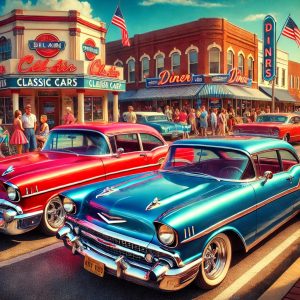Classic cars have a special place in the hearts of car enthusiasts and collectors alike. Whether it’s the elegant curves of a 1965 Ford Mustang or the raw power of a 1969 Dodge Charger, these iconic vehicles evoke nostalgia, admiration, and passion. They represent more than just transportation—they’re a testament to the innovation, style, and craftsmanship of a bygone era. Even in a world dominated by electric and self-driving cars, the allure of classic automobiles remains strong. But what makes these vintage cars so captivating, and why do they continue to hold a cherished place in our culture?

A Journey Back in Time
Classic cars take us on a journey through time, transporting us back to an era where design, speed, and performance ruled the road. The automobiles of the ’50s, ’60s, and ’70s, in particular, were crafted with an unmistakable sense of style. From the sleek lines of the Chevrolet Corvette to the luxurious interiors of the Cadillac Eldorado, these cars were built with an attention to detail that is hard to find in today’s mass-produced vehicles.
Owning or even seeing a classic car often triggers a sense of nostalgia. For many, these vehicles evoke memories of youth, family road trips, or the first time they laid eyes on a car they dreamed of owning one day. It’s not just about the car itself—it’s about the time, the culture, and the personal stories tied to these machines.
A Display of Craftsmanship
Unlike today’s cars, which rely heavily on advanced technology and automated production processes, classic cars were often handcrafted and assembled with care. Each vehicle was a unique creation, built by skilled workers who took pride in their craftsmanship. This is why classic cars tend to have a certain character that modern vehicles often lack. The attention to detail, the quality of materials, and the intricate designs all contribute to the enduring appeal of these automobiles.
Restoring a classic car is also a labor of love. Many enthusiasts spend countless hours searching for original parts and meticulously restoring their vehicles to their former glory. It’s a process that requires patience, knowledge, and dedication, but for those who are passionate about classic cars, it’s all worth it in the end.
The Sound of Power
One of the most exciting aspects of classic cars is the sound they make. The rumble of a V8 engine, the roar of a muscle car accelerating down the highway—these are sounds that modern electric vehicles simply can’t replicate. The visceral, mechanical noise of a classic engine is music to the ears of car lovers. It’s not just about getting from point A to point B; it’s about the experience of driving, feeling the power under the hood, and hearing the engine come to life with every press of the gas pedal.
A Status Symbol
For many, owning a classic car is also a status symbol. These vehicles are rare, and finding one in good condition can be difficult and expensive. As a result, owning a well-maintained classic car can be a sign of wealth, success, and good taste. Car shows, auctions, and collector events are filled with enthusiasts who appreciate the art of these vintage machines. The rarity of some models also drives up their value, making them a worthwhile investment for collectors.
A Unique Driving Experience
Driving a classic car offers a completely different experience from driving a modern vehicle. There’s no automated steering, no lane assist, and no touchscreen controls. Instead, you’re fully engaged with the road, feeling every turn and bump, and relying on your driving skills to handle the car. It’s a more physical, hands-on experience that many drivers find exhilarating. There’s a sense of freedom that comes with driving a classic car—a connection between man and machine that modern vehicles, with all their automation, often lack.
Preservation of History
Classic cars are a vital part of automotive history. Each model tells a story about the era in which it was created—the technological advancements, the cultural shifts, and the design trends of the time. By preserving these cars, enthusiasts help keep this history alive. Car museums, clubs, and events dedicated to classic cars play an important role in educating future generations about the evolution of automobiles and the impact they’ve had on society.
The enduring appeal of classic cars lies in their timeless design, craftsmanship, and the driving experience they offer. For many, these vehicles represent a connection to the past and a reminder of a time when cars were built with both passion and skill. Whether it’s the sound of a powerful engine, the sleek bodywork, or the sense of nostalgia they evoke, classic cars continue to capture the hearts of enthusiasts around the world. As we move further into an era of electric and self-driving cars, it’s clear that the love for these vintage automobiles isn’t going away anytime soon. Classic cars will always have a special place on the road—and in our hearts.
